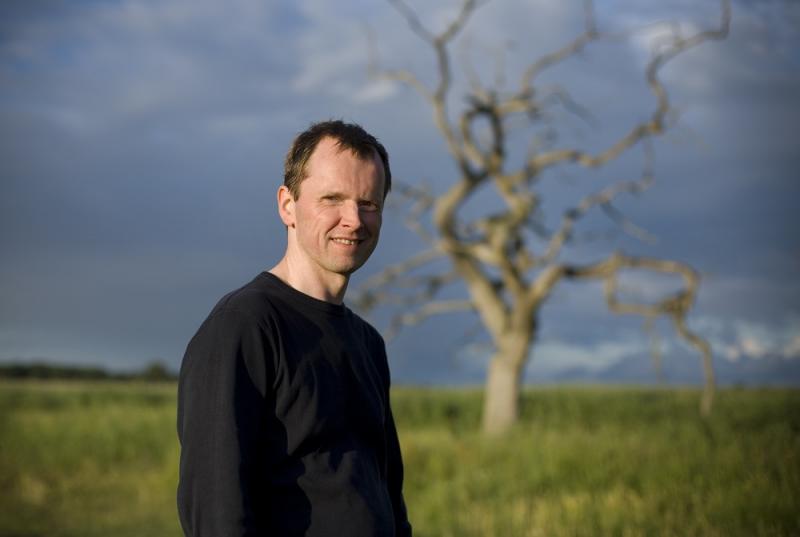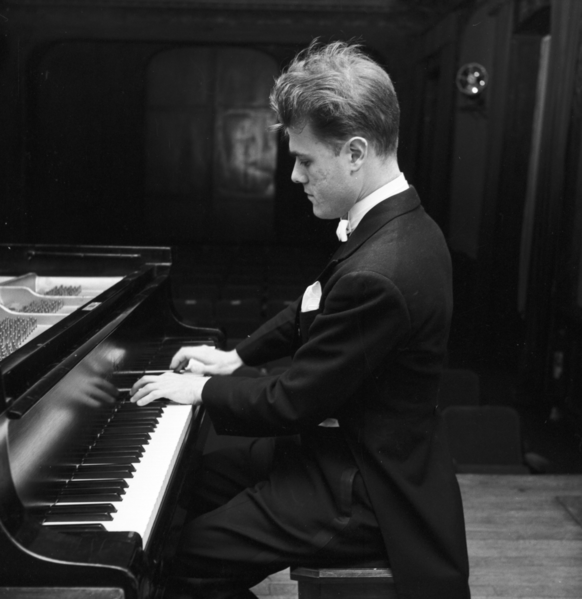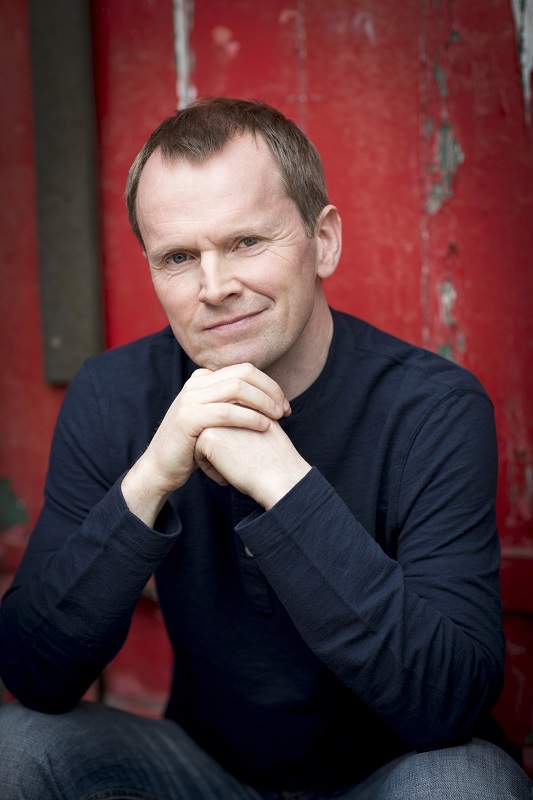'Most significant is the experience of being confronted by different ideas': Steven Osborne on free piano lessons from quarantine | reviews, news & interviews
'Most significant is the experience of being confronted by different ideas': Steven Osborne on free piano lessons from quarantine
'Most significant is the experience of being confronted by different ideas': Steven Osborne on free piano lessons from quarantine
One of the world's great pianists on why he needs to teach right now

How fast the world can change. What seemed unimaginable just weeks ago, the effective shuttering of our societies, is now a reality in many countries for at least weeks and quite possibly several months to come. I hope for the health and security of all of you reading this. I’m not going to reflect on our situation at any length as I’m sure many of you have read far more on the subject than is good for you - I certainly have!
As I reflected on months at home without concerts and thought about all of you in analogous situations, I suddenly thought it would be lovely to give a free online piano lesson each week as long as this UK lockdown continues, both getting me “out of the house” and giving others something to break up the monotony of confinement. I’ve done a lot of teaching as a visiting professor over the years, especially at the Royal Conservatoire of Scotland in Glasgow and the Royal Academy of Music in London, and I really miss it if a couple of months go by without any lessons. Undoubtedly, part of the pleasure of teaching is enjoying expressing my own feelings about music - I suspect we all have a bit of the narcissist in us (though perhaps performers more than most!). But more significant is the experience of being confronted by different ideas and swallowing one’s instinct to say “No! Do it like this!”.
For professional pianists, whose endless hours in solitude can easily breed the belief that their particular musical approach is “right”, this is an important corrective. On top of that, there is the great pleasure of witnessing emerging talent. Sometimes I’m secretly jealous of students’ technique - “I really wish I could do that!” Occasionally I’m truly moved by what a student is able to express. Perhaps most pleasurable of all are the discussions: helping students to deepen their engagement with music and exploring this almost miraculous process by which notes on a page can create something so meaningful. You never know what is going to stick.
 I have always remembered one of the pithiest bits of advice I ever got from a teacher. Hearing me trying to make a certain bit in a Chopin sonata sound ”musical” by messing with the rhythm, Charles Rosen (pictured right in younger years) told me, “Look, nothing is happening there. If nothing is happening, don’t do anything”. I still think that’s one of the wisest things I’ve ever heard about the art of interpretation. Rosen was a fascinating man - in general discussion he poured forth an endless stream (almost onslaught) of erudition, but while teaching he was surprisingly non-invasive, his comments mainly concerned with structure, simple and to the point. I only had a handful of lessons with him but I was always impressed that such a great musician could approach teaching with that kind of openness.
I have always remembered one of the pithiest bits of advice I ever got from a teacher. Hearing me trying to make a certain bit in a Chopin sonata sound ”musical” by messing with the rhythm, Charles Rosen (pictured right in younger years) told me, “Look, nothing is happening there. If nothing is happening, don’t do anything”. I still think that’s one of the wisest things I’ve ever heard about the art of interpretation. Rosen was a fascinating man - in general discussion he poured forth an endless stream (almost onslaught) of erudition, but while teaching he was surprisingly non-invasive, his comments mainly concerned with structure, simple and to the point. I only had a handful of lessons with him but I was always impressed that such a great musician could approach teaching with that kind of openness.
While we’re on the subject, Rosen could also be extremely funny. Here’s a quote where he discusses a climactic moment in Beethoven’s Op. 111 Sonata: in a slow melody, the highest note on the keyboard is held for a long time, far longer than it can survive acoustically….
More than any other composer before him, Beethoven understood the pathos of the gap between idea and realisation, and the sense of strain put on the listener's imagination is essential here. The best argument for using the pianos of Beethoven's time in place of the modern grand piano is not the aptness of the old instruments but their greater inadequacy for realising such an effect, and consequently the more dramatic effort required of the listener. The modern piano, however, is sufficiently inadequate to convey Beethoven's intentions.
 I digress. How are the free lessons going to work? If you’re interested, just send me an email to freepianolesson@excite.com, and at the end of each week I’ll put them all into a virtual hat and pick one out. I’m sorry I won’t be able to answer your emails but I’ll inform the winner each Monday and post their name on my blog, starting 7 April. I’ll write a further blog post when I’m stopping - I may extend beyond the lockdown depending how long it lasts - so until then, assume the offer is still open. I want to emphasise that amateurs are welcome - part of the pleasure of this endeavour is meeting people from different backgrounds and sharing an hour or so around music. Whatever you want to get out of the lesson is fine, whether you’re a music student wanting a masterclass kind of thing, or an amateur wanting some tidbits of advice, some chat, and a hopefully diverting hour. But I’d suggest no beginners because I’m no use teaching beginners: something like ABRSM Grade 5 and above is fine. This will be genuinely random, so there’s no need to waste time wondering what to write.
I digress. How are the free lessons going to work? If you’re interested, just send me an email to freepianolesson@excite.com, and at the end of each week I’ll put them all into a virtual hat and pick one out. I’m sorry I won’t be able to answer your emails but I’ll inform the winner each Monday and post their name on my blog, starting 7 April. I’ll write a further blog post when I’m stopping - I may extend beyond the lockdown depending how long it lasts - so until then, assume the offer is still open. I want to emphasise that amateurs are welcome - part of the pleasure of this endeavour is meeting people from different backgrounds and sharing an hour or so around music. Whatever you want to get out of the lesson is fine, whether you’re a music student wanting a masterclass kind of thing, or an amateur wanting some tidbits of advice, some chat, and a hopefully diverting hour. But I’d suggest no beginners because I’m no use teaching beginners: something like ABRSM Grade 5 and above is fine. This will be genuinely random, so there’s no need to waste time wondering what to write.
Four points:
- The lesson will take place over Zoom or FaceTime
- You need to speak decent English
- Please don’t nominate your child unless he or she is enthusiastic!
- You don’t have to email every week – I’ll keep them all for subsequent draws
Good luck! And I wish all of you the best in this very challenging time.
- Put forward your name to be drawn out of the hat to freepianolesson@excite.com
- Osborne's new Prokofiev sonatas disc reviewed by David Nice in the BBC Music Magazine
- Read classical music reviews on theartsdesk
Explore topics
Share this article
The future of Arts Journalism
You can stop theartsdesk.com closing!
We urgently need financing to survive. Our fundraising drive has thus far raised £49,000 but we need to reach £100,000 or we will be forced to close. Please contribute here: https://gofund.me/c3f6033d
And if you can forward this information to anyone who might assist, we’d be grateful.

Subscribe to theartsdesk.com
Thank you for continuing to read our work on theartsdesk.com. For unlimited access to every article in its entirety, including our archive of more than 15,000 pieces, we're asking for £5 per month or £40 per year. We feel it's a very good deal, and hope you do too.
To take a subscription now simply click here.
And if you're looking for that extra gift for a friend or family member, why not treat them to a theartsdesk.com gift subscription?
more Classical music
 theartsdesk at the Three Choirs Festival - Passion in the Cathedral
Cantatas new and old, slate quarries to Calvary
theartsdesk at the Three Choirs Festival - Passion in the Cathedral
Cantatas new and old, slate quarries to Calvary
 BBC Proms: Estonian Philharmonic Chamber Choir, Kaljuste review - Arvo Pärt 90th birthday tribute
Stillness and contemplation characterise this well sung late-nighter
BBC Proms: Estonian Philharmonic Chamber Choir, Kaljuste review - Arvo Pärt 90th birthday tribute
Stillness and contemplation characterise this well sung late-nighter
 BBC Proms: Kholodenko, BBCNOW, Otaka review - exhilarating Lutosławski, underwhelming Rachmaninov
Polish composers to the fore in veteran conductor’s farewell
BBC Proms: Kholodenko, BBCNOW, Otaka review - exhilarating Lutosławski, underwhelming Rachmaninov
Polish composers to the fore in veteran conductor’s farewell
 theartsdesk at the Pärnu Music Festival 2025 - Arvo Pärt at 90 flanked by lightness and warmth
Paavo Järvi’s Estonian Festival Orchestra still casts its familiar spell
theartsdesk at the Pärnu Music Festival 2025 - Arvo Pärt at 90 flanked by lightness and warmth
Paavo Järvi’s Estonian Festival Orchestra still casts its familiar spell
 BBC Proms: Batsashvili, BBC Scottish Symphony Orchestra, Ryan Wigglesworth review - grief and glory
Subdued Mozart yields to blazing Bruckner
BBC Proms: Batsashvili, BBC Scottish Symphony Orchestra, Ryan Wigglesworth review - grief and glory
Subdued Mozart yields to blazing Bruckner
 Classical CDs: Hens, Hamburg and handmaids
An unsung French conductor boxed up, plus Argentinian string quartets and baroque keyboard music
Classical CDs: Hens, Hamburg and handmaids
An unsung French conductor boxed up, plus Argentinian string quartets and baroque keyboard music
 BBC Proms: McCarthy, Bournemouth SO, Wigglesworth review - spring-heeled variety
A Ravel concerto and a Walton symphony with depth but huge entertainment value
BBC Proms: McCarthy, Bournemouth SO, Wigglesworth review - spring-heeled variety
A Ravel concerto and a Walton symphony with depth but huge entertainment value
 BBC Proms: First Night, Batiashvili, BBCSO, Oramo review - glorious Vaughan Williams
Spirited festival opener is crowned with little-heard choral epic
BBC Proms: First Night, Batiashvili, BBCSO, Oramo review - glorious Vaughan Williams
Spirited festival opener is crowned with little-heard choral epic
 Interview: Quinteto Astor Piazzolla on playing in London and why Mick Jagger's a fan
Music Director Julián Vat and pianist Matias Feigin compare notes on Piazzolla
Interview: Quinteto Astor Piazzolla on playing in London and why Mick Jagger's a fan
Music Director Julián Vat and pianist Matias Feigin compare notes on Piazzolla
 Classical CDs: Bells, birdsong and braggadocio
British contemporary music, percussive piano concertos and a talented baritone sings Mozart
Classical CDs: Bells, birdsong and braggadocio
British contemporary music, percussive piano concertos and a talented baritone sings Mozart
 Siglo de Oro, Wigmore Hall review - electronic Lamentations and Trojan tragedy
Committed and intense performance of a newly-commissioned oratorio
Siglo de Oro, Wigmore Hall review - electronic Lamentations and Trojan tragedy
Committed and intense performance of a newly-commissioned oratorio

Add comment